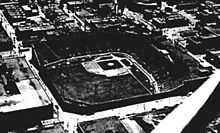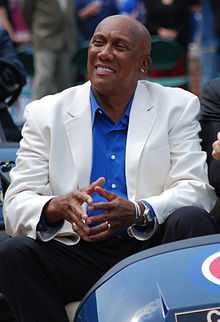Baseball in Canada
| Baseball in Canada | |
|---|---|
| Country | Canada |
| Governing body | Baseball Canada |
| National team | Canada |
| First played | Beachville, Ontario, 1838 |
Club competitions | |
| |
Baseball has a long history in Canada, where it is one of the most popular sports. While there are currently no major leagues in Canada, there is one major league team: the Toronto Blue Jays of the United States-based Major League Baseball (MLB). Canada's first MLB team was the Montreal Expos, founded through league expansion in 1969, although the team would eventually relocate to Washington, D.C in 2005.
Over the years at least 75 cities and towns have been home to minor league baseball teams.[1] There is currently only one MLB-affiliated minor league team in the country: the Vancouver Canadians of the Class A Northwest League, an affiliate of the Blue Jays.
There are also several independent league teams in Canada playing in the Can-Am League and the American Association.
Ontario is home to a semi-professional league, known as the Intercounty Baseball League. Quebec has a similar league, the Ligue de Baseball Senior Élite du Québec. There are additionally amateur-level baseball teams playing in each province during the summer months. There are also several American-based collegiate leagues that have teams in Canada.
Baseball Canada
The governing body of baseball in Canada is Baseball Canada, which is based in Ottawa and was founded in 1964. Baseball Canada is a member of the Canadian Olympic Committee and the International Baseball Federation.
National team
The Canadian national baseball team represents Canada in international competitions. Since 1970, the team has participated in 17 Baseball World Cups. Canada earned the bronze medal in the 2009 Baseball World Cup, their highest finish in the history of the competition. In the 2004 Summer Olympics they placed fourth, losing the game for 3rd place to Japan and, in 2008, they finished fifth. In two appearances so far at the World Baseball Classic, the team has not finished higher than 9th place.
History
| Part of the Baseball series on History of baseball |
• Close relations: • History of baseball in:
• Negro league baseball |
| Baseball Portal |
19th century
Adapted from the British game of rounders — and by extension, cricket — the game of base ball or "townball" became popular in the early 19th century in Southwestern Ontario (then Canada West or Upper Canada), New York and New England.
The first documented evidence of a base ball game in Canada comes from a letter published in Sporting Life magazine in 1886, a letter by Dr. Adam E. Ford of Denver, Colorado, formerly of St. Marys, Ontario and Beachville, Ontario, about a game 48 years earlier in Beachville on June 4, 1838 — Militia Muster Day. Many Canadians, including the staff of the Canadian Baseball Hall of Fame and Museum in St. Marys, Ontario, claim that this was the first documented game of modern baseball, although there appears to be no evidence that the rules used in this game were codified and adopted in other regions.
Originally, the rules of the game were informal in nature and often modified to reflect regional preferences.
In Ontario, a variant of baseball known as "The Canadian Game" was most prevalent. It featured five bases, bats that resembled those used in cricket or rounders and eleven players per team. All eleven players went to bat each inning, which would not end until they were all retired.
The American variant of baseball had nine players a side instead of eleven, and four bases instead of five. Southwestern Ontario was the first region in Canada to adopt this version of the game, doing so in 1860.[1]
The London Tecumsehs of London, Ontario were charter members of the International Association and won its first championship in 1877, beating the Pittsburgh Alleghenies.
Rather than competing nationally in an east-west fashion, local baseball clubs would instead compete with their American neighbours to the south. This meant that teams from the Maritimes played teams from New England, teams from Quebec played against teams from New York and teams from British Columbia competed with those from Washington.[1]
The first Canadian to appear in a Major League game was Bill Phillips, who played for Cleveland. In his first game on May 1, 1879, the Saint John, New Brunswick native went hitless, although managed to get three hits the next game. In his second season, in 1880, he became the first Canadian to hit a home run in the Majors.[1]
Early 20th century

By 1913, there were 24 minor league baseball teams in Canada. This number has since been unequaled.[1]
Babe Ruth hit his first professional home run on Canadian soil on September 5, 1914 at the former Hanlan's Point Stadium on Centre Island in Toronto. Ruth was playing for the Providence Grays against the Toronto Maple Leafs baseball team of the International League. In 1985, the City of Toronto erected a small plaque to denote the location, but it is difficult to locate, given the parklike setting and remote nature of the Toronto Islands.
In 1946, Brooklyn Dodgers general manager Branch Rickey assigned new-signing Jackie Robinson to the Montreal Royals of the International League, Brooklyn's Triple-A farm team. Robinson would famously go on to break Major League Baseball's colour barrier the following year in 1947, but during his season in Montreal Robinson led the Royals to the Governors' Cup, the IL championship, and became a beloved figure in the city. In Ken Burns' documentary film Baseball, the narrator quotes Sam Maltin, a stringer for the Pittsburgh Courier: "It was probably the only day in history that a black man ran from a white mob with love instead of lynching on its mind."
In 1957, former Cincinnati Reds and Philadelphia Phillies outfielder Glen Gorbous, a native of Drumheller, Alberta set the current world record for longest throw of a baseball at 445 feet, 10 inches (135.89m) in Omaha, Nebraska.
Late 20th century and beyond
The lone Canadian in the National Baseball Hall of Fame is Ferguson Jenkins, a right-handed pitcher who compiled a 284-226 record, 3.34 ERA and 3,192 strikeouts in 19 seasons from 1965 to 1983 with the Philadelphia Phillies, Chicago Cubs, Texas Rangers, and Boston Red Sox. Jenkins is considered an anchor of the Black Aces, a group of African American pitchers with at least twenty wins in one season (although Jenkins is actually a Black Canadian, not African American).
While baseball is widely played in Canada, the American major leagues did not include a Canadian team until 1969, when the Montreal Expos joined the National League (the London Tecumsehs were refused admission to the National League in 1877 because they refused to stop playing exhibition games against local teams). The team enjoyed a widespread following until abut 1994 (when the Expos were in first place in the NL East); after the strike shortened year a series of poor management decisions, disputes with the city, and neglect by the ownership caused the Expos to be routinely last in MLB attendance. In 2004, the Expos, then owned by MLB itself, moved to Washington, DC and became the Washington Nationals.
In 1977, the Toronto Blue Jays joined the American League. They later became the first Canadian-based team to win the World Series, winning back-to-back titles in 1992 and 1993.
In 2003 an attempt to create the Canadian Baseball League was launched, but the league folded halfway through its first season.
Teams
Only one Canadian team plays in the so-called "affiliated" minor leagues, defined as those having a formal relationship with Major League Baseball. The Vancouver Canadians, currently an affiliate of the Blue Jays, play in the Northwest League at the Short-Season A level. Several other Canada-based teams play in low-tier American independent circuits. See List of baseball teams in Canada.
Players

Canada has produced some successful players in Major League Baseball. Ferguson Jenkins is currently the only Canadian in the National Baseball Hall of Fame. The following table lists other achievements earned by Canadian baseball players.
| Award | Player | Year |
|---|---|---|
| MLB Most Valuable Player Award | Larry Walker | 1997 |
| MLB Most Valuable Player Award | Justin Morneau | 2006 |
| MLB Most Valuable Player Award | Joey Votto | 2010 |
| Cy Young Award | Ferguson Jenkins | 1971 |
| Cy Young Award | Éric Gagné | 2003 |
| MLB Rookie of the Year Award | Jason Bay | 2004 |
| Silver Slugger Award | Justin Morneau | 2006, 2008 |
| Silver Slugger Award | Russell Martin | 2006 |
| Silver Slugger Award | Larry Walker | 1992, 1997, 1999 |
| Silver Slugger Award | Jason Bay | 2009 |
| Gold Glove | Russell Martin | 2007 |
| Gold Glove | Larry Walker | 1992, 1993, 1997, 1998, 1999, 2001, 2002 |
| Rolaids Relief Man Award | John Axford | 2011 |
See also
- Baseball Canada
- Canada national baseball team
- List of baseball teams in Canada
- List of Major League Baseball players from Canada
- Canadian Baseball Hall of Fame
- Pearson Cup
References
- ↑ 1.0 1.1 1.2 1.3 1.4 "2010-2014 Strategic Planning Document". Baseball Canada. 2010. pp. 2, 3. Retrieved 6 January 2011.
External links
| |||||||||||||||||||||||||||||||||||||||||||||||
| |||||||||||||||||||||||